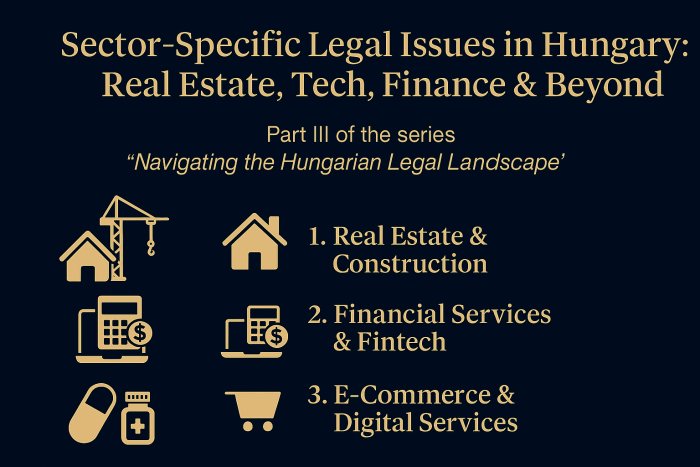Part III of the series “Navigating the Hungarian Legal Landscape”
While general corporate and tax rules in Hungary are attractive to international investors, certain key sectors carry additional legal complexity. Whether due to EU regulations, local licensing requirements, or specific Hungarian practices, foreign businesses must be aware of sector-specific legal risks.
This final article in our series highlights important sector-based considerations for companies operating or investing in Hungary — with practical tips to stay compliant and competitive.
1. Real Estate & Construction
Hungary’s real estate market remains popular with foreign investors — from commercial projects in Budapest to residential and logistics assets.
Legal challenges:
- Due diligence: Title issues, encumbrances, and restitution claims must be carefully reviewed.
- Planning & permits: Local zoning, building permits, and heritage protection rules vary significantly by municipality.
- Foreign ownership restrictions: Agricultural land remains restricted for non-EU nationals.
- Energy efficiency & ESG: Increasing regulatory focus on green building standards.
Tip: Engage local legal counsel early in transactions. Full title review and permit verification are critical to avoiding costly disputes.
2. Financial Services & Fintech
Hungary has an active National Bank of Hungary (MNB) supervisory regime. The financial sector is highly regulated and faces EU-wide standards plus local nuances.
Legal challenges:
- Licensing: Payment services, lending platforms, and investment advisory businesses generally require an MNB license.
- AML compliance: Hungary enforces strict AML/KYC obligations, even for new crypto businesses.
- Cross-border services: The legal test for whether your EU license covers Hungary is nuanced — legal advice is essential.
Tip: Do not assume an EU passporting license alone is sufficient. Regulatory advice and dialogue with MNB are key for fintech players.
3. E-Commerce & Digital Services
Hungary is a fast-growing e-commerce market — but one with strict consumer protection and data privacy laws.
Legal challenges:
- Consumer law: Returns, refund policies, and information obligations are rigorously enforced.
- GDPR: Hungary has one of the most active national data protection authorities in the region.
- Platform liability: Operators of online marketplaces face increasing obligations to monitor content and ensure transparency.
Tip: Have a legally vetted Hungarian-language Terms & Conditions and Privacy Policy. These are not just translations of your home-country documents.
4. Pharmaceuticals & Healthcare
The healthcare and pharma sectors are heavily regulated in Hungary, with detailed licensing and marketing rules.
Legal challenges:
- Licensing: Medical devices, supplements, and pharmaceuticals face strict registration and marketing approval processes.
- Advertising restrictions: Public health laws impose tight limits on how healthcare products can be marketed.
- Distribution channels: Some pharma and med-tech business models face local restrictions on direct-to-consumer or cross-border sales.
Tip: Engage with local legal and regulatory consultants. Hungary has nuances in health-sector marketing that differ from EU norms.
5. Transportation & Logistics
Hungary’s location as a CEE logistics hub makes it attractive for supply chain businesses — but compliance is not trivial.
Legal challenges:
- Transport licenses: Road, rail, and warehousing businesses face sector-specific licensing.
- Cabotage restrictions: Foreign transport companies must carefully structure their Hungary-based operations.
- Tax & customs: Special VAT and customs rules apply for cross-border warehouse and fulfillment models.
Tip: Map your supply chain carefully. Tax and licensing compliance is key to avoiding disruptions.
6. Media, Content & IP-Driven Businesses
Hungary has an evolving IP and media law landscape, influenced by both EU directives and strong local rules.
Legal challenges:
- Media licensing: Certain audiovisual services and broadcasters require Hungarian licensing.
- Advertising rules: Rules on alcohol, financial products, and health claims are stricter than some foreign advertisers expect.
- IP enforcement: Hungary offers efficient IP enforcement tools but also local procedural quirks.
Tip: Have local counsel review your marketing and content strategies — particularly if using influencers or cross-border digital campaigns.
Final Thoughts
Hungary offers enormous opportunities across diverse sectors — but each comes with its own legal landscape. Smart investors and operators engage sector-specific legal expertise early to structure their businesses correctly, ensure compliance, and avoid surprises.
If your business is entering a regulated or fast-evolving sector in Hungary, working with local legal counsel is not just advisable — it is essential to long-term success.
Need Help Navigating Sector-Specific Legal Issues in Hungary?
Our firm advises international clients across real estate, finance, technology, healthcare, and more. We offer practical, business-minded legal support — helping you succeed in Hungary’s dynamic legal landscape.
Contact us to discuss your needs.
E-mal: info@radvanszki.eu
Tel: +36 30 475 3115




